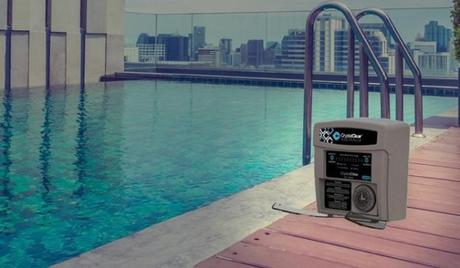Owning a saltwater chlorinator for your pool may seem luxurious; however, it also requires a specific maintenance routine. Listening to experts is crucial for maintaining fresh, clean pool water without the overpowering scent of chlorine. As a pool owner, you have made a wise decision by choosing a saltwater system. Now, let's explore methods for maintaining the efficient operation of those chlorinator cells.

The Golden Rule: Clean, Clean, Clean
The tip for keeping your saltwater chlorinator cell in good condition is to clean it regularly. And we're not talking about a quick rinse now and then. You'll want to give that salt cell a deep clean at least 5 to 6 times every year.
Here's how the pros recommend doing it:
Turn off the chlorinator and pump to avoid any electrical hazards.
Remove the cell from its housing, following the manufacturer's instructions.
Soak the cell in a solution of Hydrochloric Acid and water
Let it soak for the recommended amount of time, usually a few hours.
Scrub away any remaining scale or buildup with a soft-bristle brush.
Rinse the cell thoroughly with fresh water.
Reinstall the clean cell and get your system running again.
What Is the Average Lifespan Of Pool Chlorinator Cells?
A salt cell is the part of a pool water cleaning system responsible for generating chlorine gas. The cell uses an electrolytic method to transform salt (sodium chloride) into chlorine and sodium hydroxide.
While chlorinator cells are built to operate for up to 5 -7 years, this is just a rough estimation. The actual lifespan can vary based on several factors, including water quality, the number of swimmers using the pool, and how frequently the pool is used. These factors can all impact how long the pool salt water chlorinator cell will last before needing replacement.
What Are The Signs That My Pool Salt Cell Requires Replacement?
It's time to replace your pool's chlorinator cell if you observe any of the following indicators:
Cloudy water that lacks clarity and transparency.
Visible particles or debris are suspended in the pool water.
An overpowering odour of chlorine emanates from the pool or spa area.
When the chlorinator cell starts to degrade or fail, it can no longer effectively produce adequate chlorine levels to properly sanitise and clarify the water. A salt cell replacement will restore the system's ability to generate chlorine and maintain ideal pool chemistry and water quality conditions.
Listen to the Pros, Extend the Life
Maintaining your saltwater chlorinator cell may seem like a chore, but it's a small price to pay for crystal-clear pool water without that overpowering chlorine smell. By following the above tips, you'll be well on your way to extending the life of your cell and enjoying your pool for years to come.
Remember, a little preventative maintenance now can save you big bucks in the long run.
Fraquoh and Franchomme
P.S. We want to hear from you! Do you own a pool? What type is it? How do you maintain it? Share your feedback, questions or thoughts in the comments below! For more articles on style, fashion tips and cultural insights, you can subscribe to Attire Club via e-mail or follow us on Facebook, Twitter or Instagram!

